Impact of Service Quality on Customer Satisfaction: JW Marriott Study
VerifiedAdded on 2020/06/04
|13
|4612
|70
Report
AI Summary
This report investigates the impact of service quality on customer satisfaction within the hospitality industry, using JW Marriott Hotels as a case study. It begins with an introduction to the importance of customer satisfaction and the role of service quality in the hospitality sector. The research problem is formulated, along with specific aims and objectives, including determining the dimensional concept of service quality, identifying the importance of providing quality services, and evaluating how service quality influences customer satisfaction. The report includes a comprehensive literature review exploring the dimensions of service quality (tangibles, responsiveness, empathy, reliability, and assurance) and their impact on customer satisfaction, as well as the importance of customer expectations and loyalty. The research methodology and ethical considerations are discussed, followed by a plan of work and references. The study aims to provide recommendations for improving service quality and enhancing customer satisfaction at JW Marriott Hotels, specifically focusing on its Grosvenor House location in London.
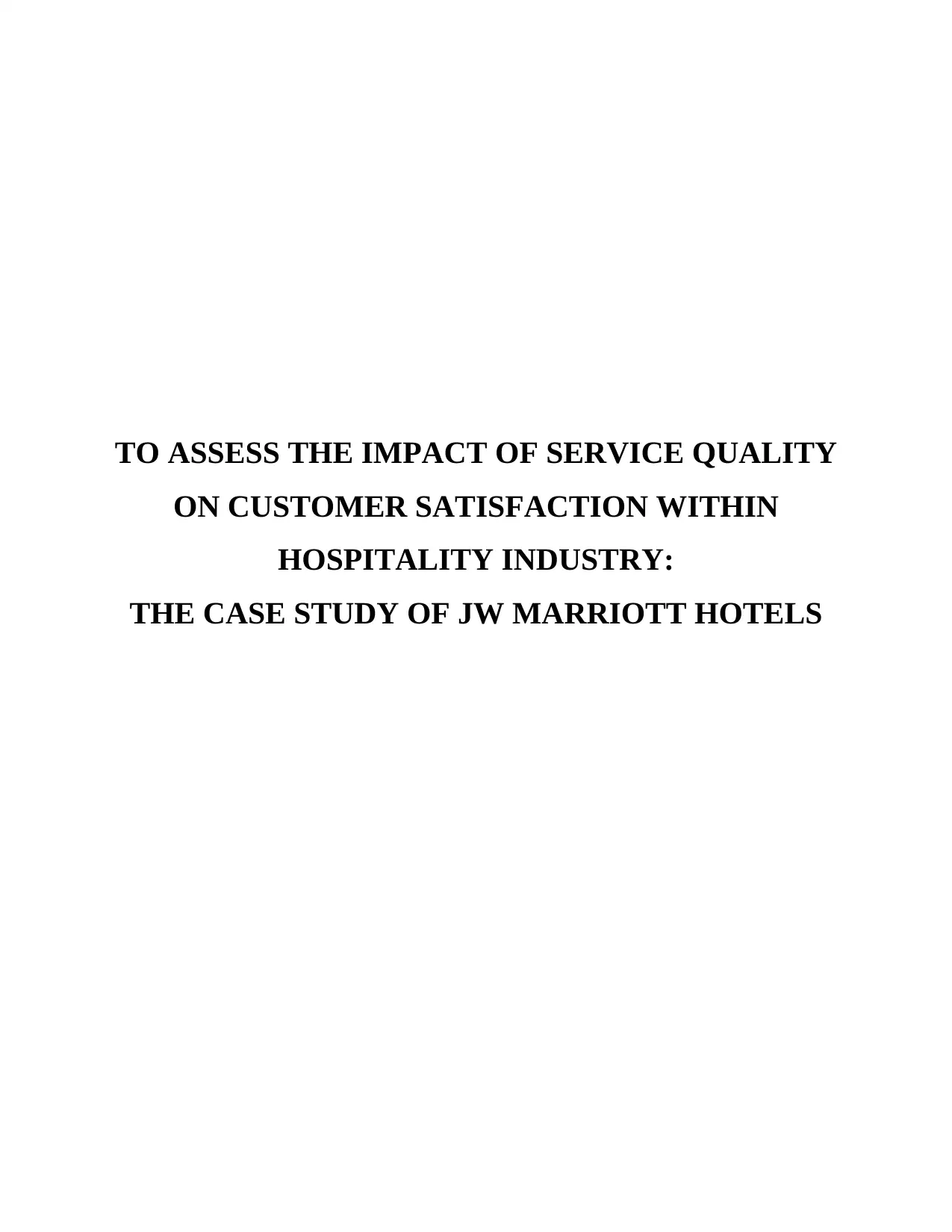
TO ASSESS THE IMPACT OF SERVICE QUALITY
ON CUSTOMER SATISFACTION WITHIN
HOSPITALITY INDUSTRY:
THE CASE STUDY OF JW MARRIOTT HOTELS
ON CUSTOMER SATISFACTION WITHIN
HOSPITALITY INDUSTRY:
THE CASE STUDY OF JW MARRIOTT HOTELS
Paraphrase This Document
Need a fresh take? Get an instant paraphrase of this document with our AI Paraphraser
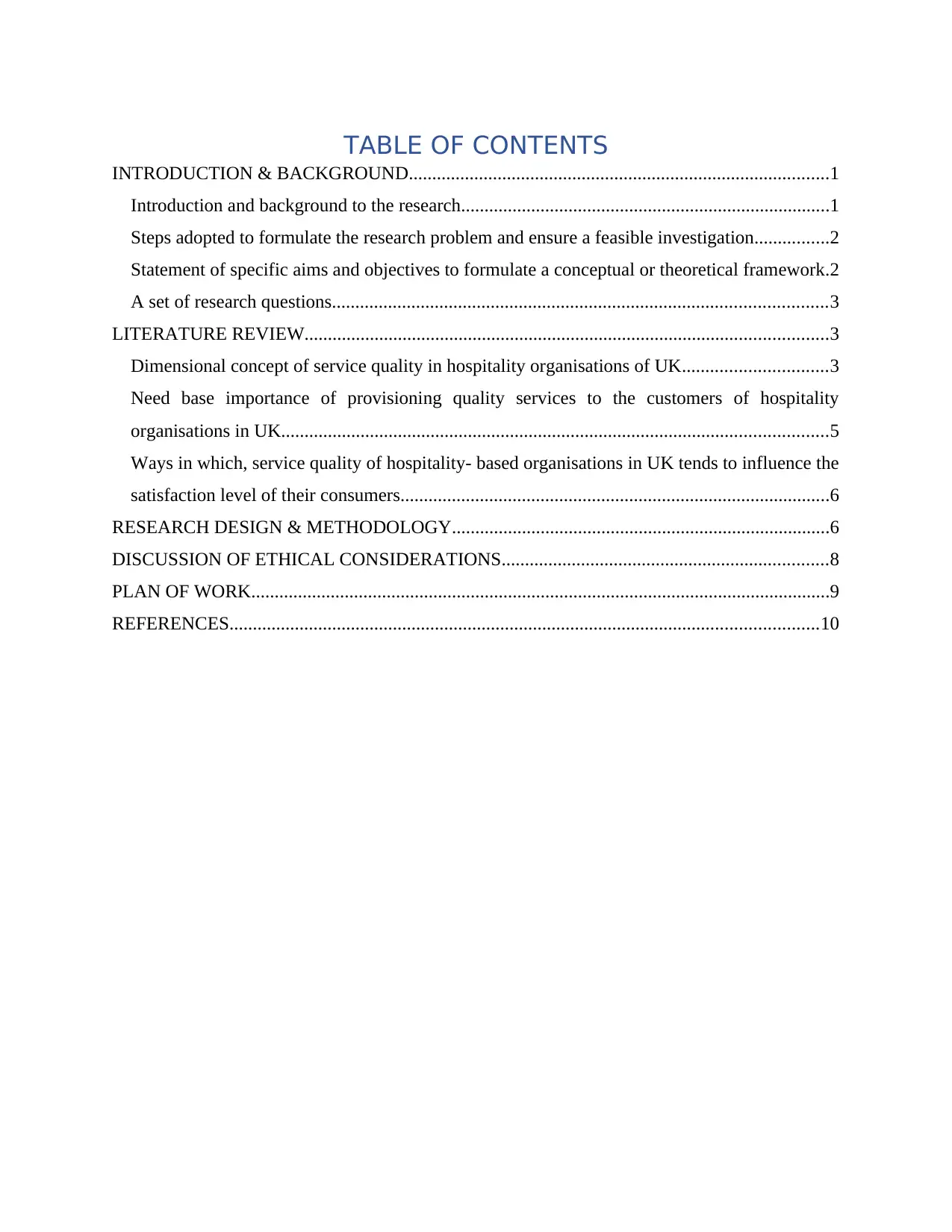
TABLE OF CONTENTS
INTRODUCTION & BACKGROUND..........................................................................................1
Introduction and background to the research...............................................................................1
Steps adopted to formulate the research problem and ensure a feasible investigation................2
Statement of specific aims and objectives to formulate a conceptual or theoretical framework.2
A set of research questions..........................................................................................................3
LITERATURE REVIEW................................................................................................................3
Dimensional concept of service quality in hospitality organisations of UK...............................3
Need base importance of provisioning quality services to the customers of hospitality
organisations in UK.....................................................................................................................5
Ways in which, service quality of hospitality- based organisations in UK tends to influence the
satisfaction level of their consumers............................................................................................6
RESEARCH DESIGN & METHODOLOGY.................................................................................6
DISCUSSION OF ETHICAL CONSIDERATIONS......................................................................8
PLAN OF WORK............................................................................................................................9
REFERENCES..............................................................................................................................10
INTRODUCTION & BACKGROUND..........................................................................................1
Introduction and background to the research...............................................................................1
Steps adopted to formulate the research problem and ensure a feasible investigation................2
Statement of specific aims and objectives to formulate a conceptual or theoretical framework.2
A set of research questions..........................................................................................................3
LITERATURE REVIEW................................................................................................................3
Dimensional concept of service quality in hospitality organisations of UK...............................3
Need base importance of provisioning quality services to the customers of hospitality
organisations in UK.....................................................................................................................5
Ways in which, service quality of hospitality- based organisations in UK tends to influence the
satisfaction level of their consumers............................................................................................6
RESEARCH DESIGN & METHODOLOGY.................................................................................6
DISCUSSION OF ETHICAL CONSIDERATIONS......................................................................8
PLAN OF WORK............................................................................................................................9
REFERENCES..............................................................................................................................10
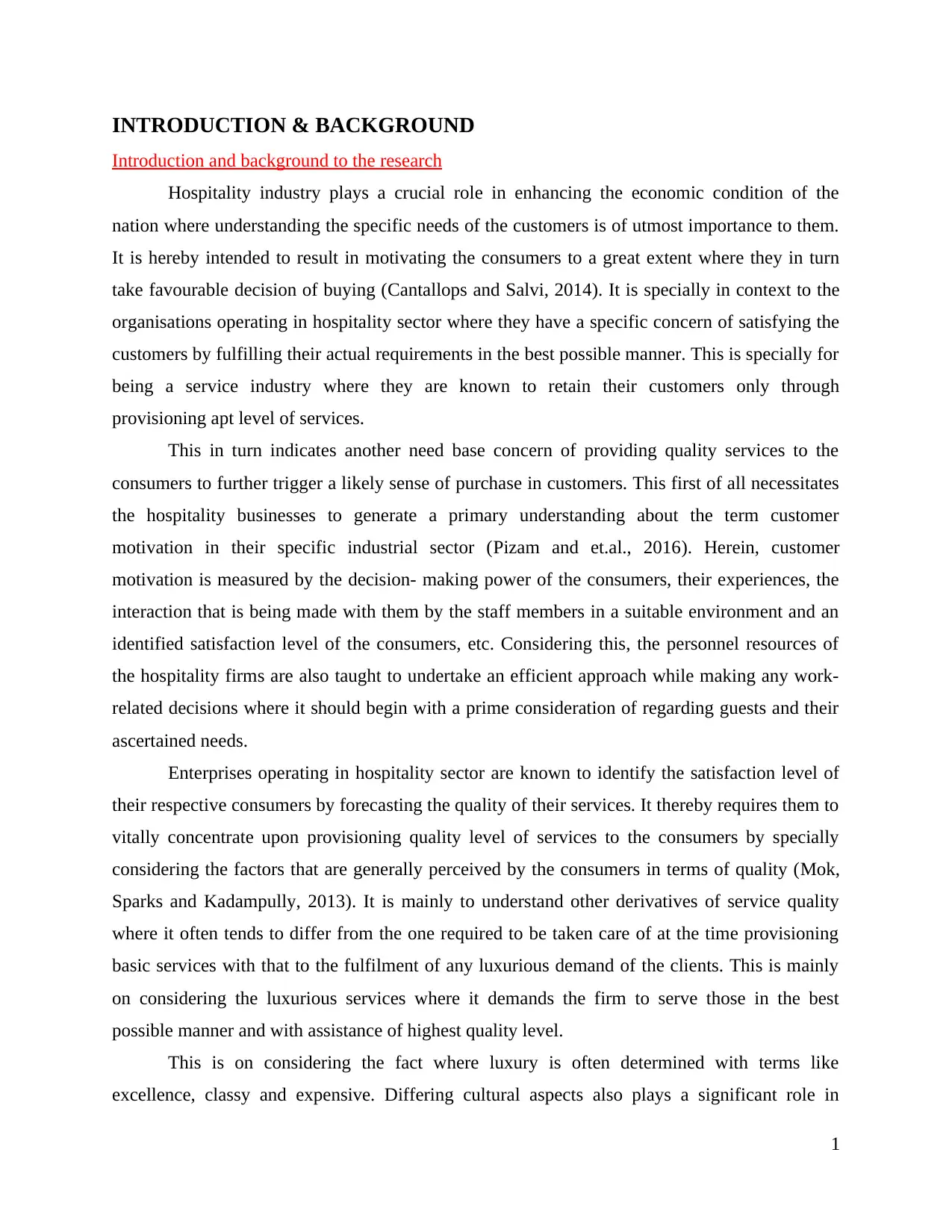
INTRODUCTION & BACKGROUND
Introduction and background to the research
Hospitality industry plays a crucial role in enhancing the economic condition of the
nation where understanding the specific needs of the customers is of utmost importance to them.
It is hereby intended to result in motivating the consumers to a great extent where they in turn
take favourable decision of buying (Cantallops and Salvi, 2014). It is specially in context to the
organisations operating in hospitality sector where they have a specific concern of satisfying the
customers by fulfilling their actual requirements in the best possible manner. This is specially for
being a service industry where they are known to retain their customers only through
provisioning apt level of services.
This in turn indicates another need base concern of providing quality services to the
consumers to further trigger a likely sense of purchase in customers. This first of all necessitates
the hospitality businesses to generate a primary understanding about the term customer
motivation in their specific industrial sector (Pizam and et.al., 2016). Herein, customer
motivation is measured by the decision- making power of the consumers, their experiences, the
interaction that is being made with them by the staff members in a suitable environment and an
identified satisfaction level of the consumers, etc. Considering this, the personnel resources of
the hospitality firms are also taught to undertake an efficient approach while making any work-
related decisions where it should begin with a prime consideration of regarding guests and their
ascertained needs.
Enterprises operating in hospitality sector are known to identify the satisfaction level of
their respective consumers by forecasting the quality of their services. It thereby requires them to
vitally concentrate upon provisioning quality level of services to the consumers by specially
considering the factors that are generally perceived by the consumers in terms of quality (Mok,
Sparks and Kadampully, 2013). It is mainly to understand other derivatives of service quality
where it often tends to differ from the one required to be taken care of at the time provisioning
basic services with that to the fulfilment of any luxurious demand of the clients. This is mainly
on considering the luxurious services where it demands the firm to serve those in the best
possible manner and with assistance of highest quality level.
This is on considering the fact where luxury is often determined with terms like
excellence, classy and expensive. Differing cultural aspects also plays a significant role in
1
Introduction and background to the research
Hospitality industry plays a crucial role in enhancing the economic condition of the
nation where understanding the specific needs of the customers is of utmost importance to them.
It is hereby intended to result in motivating the consumers to a great extent where they in turn
take favourable decision of buying (Cantallops and Salvi, 2014). It is specially in context to the
organisations operating in hospitality sector where they have a specific concern of satisfying the
customers by fulfilling their actual requirements in the best possible manner. This is specially for
being a service industry where they are known to retain their customers only through
provisioning apt level of services.
This in turn indicates another need base concern of providing quality services to the
consumers to further trigger a likely sense of purchase in customers. This first of all necessitates
the hospitality businesses to generate a primary understanding about the term customer
motivation in their specific industrial sector (Pizam and et.al., 2016). Herein, customer
motivation is measured by the decision- making power of the consumers, their experiences, the
interaction that is being made with them by the staff members in a suitable environment and an
identified satisfaction level of the consumers, etc. Considering this, the personnel resources of
the hospitality firms are also taught to undertake an efficient approach while making any work-
related decisions where it should begin with a prime consideration of regarding guests and their
ascertained needs.
Enterprises operating in hospitality sector are known to identify the satisfaction level of
their respective consumers by forecasting the quality of their services. It thereby requires them to
vitally concentrate upon provisioning quality level of services to the consumers by specially
considering the factors that are generally perceived by the consumers in terms of quality (Mok,
Sparks and Kadampully, 2013). It is mainly to understand other derivatives of service quality
where it often tends to differ from the one required to be taken care of at the time provisioning
basic services with that to the fulfilment of any luxurious demand of the clients. This is mainly
on considering the luxurious services where it demands the firm to serve those in the best
possible manner and with assistance of highest quality level.
This is on considering the fact where luxury is often determined with terms like
excellence, classy and expensive. Differing cultural aspects also plays a significant role in
1
⊘ This is a preview!⊘
Do you want full access?
Subscribe today to unlock all pages.

Trusted by 1+ million students worldwide
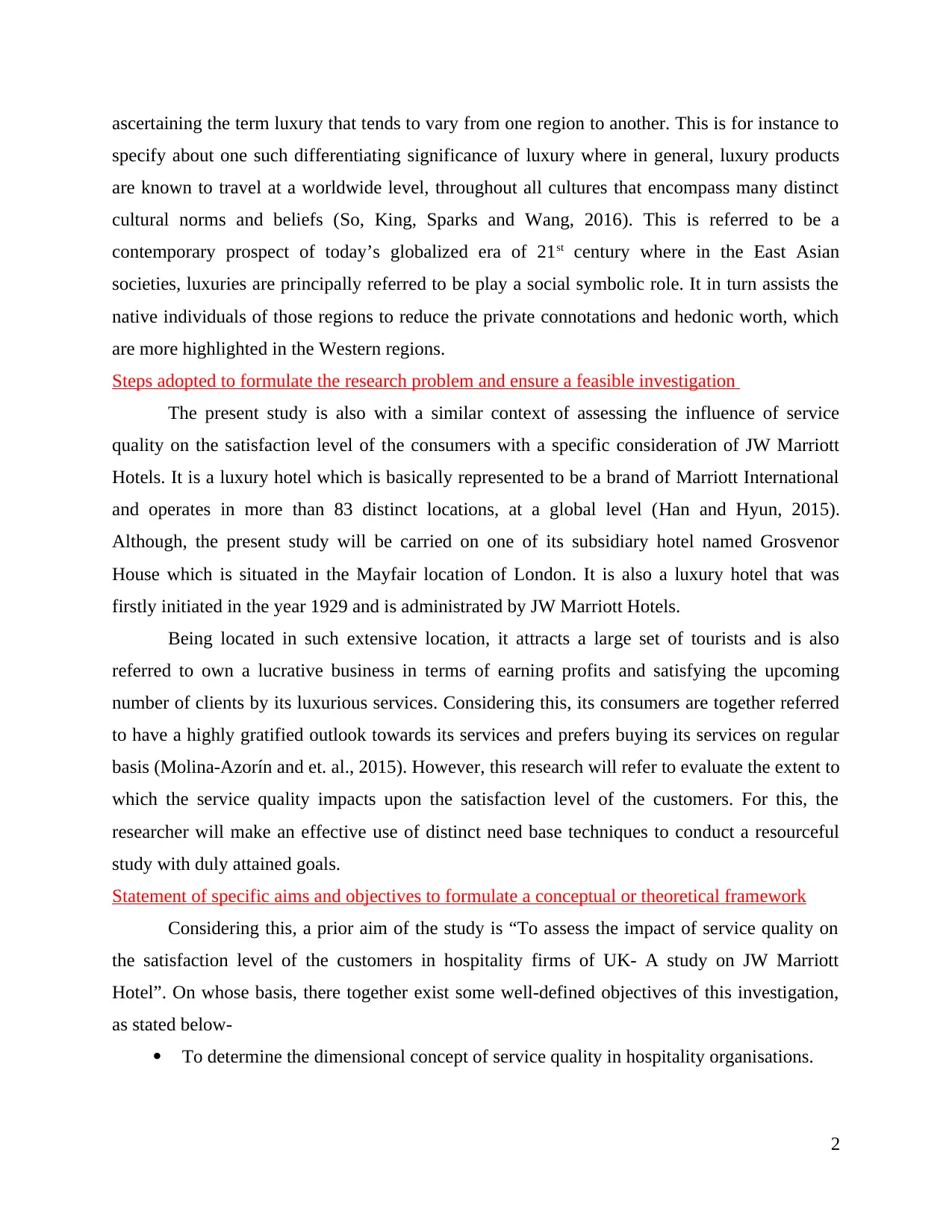
ascertaining the term luxury that tends to vary from one region to another. This is for instance to
specify about one such differentiating significance of luxury where in general, luxury products
are known to travel at a worldwide level, throughout all cultures that encompass many distinct
cultural norms and beliefs (So, King, Sparks and Wang, 2016). This is referred to be a
contemporary prospect of today’s globalized era of 21st century where in the East Asian
societies, luxuries are principally referred to be play a social symbolic role. It in turn assists the
native individuals of those regions to reduce the private connotations and hedonic worth, which
are more highlighted in the Western regions.
Steps adopted to formulate the research problem and ensure a feasible investigation
The present study is also with a similar context of assessing the influence of service
quality on the satisfaction level of the consumers with a specific consideration of JW Marriott
Hotels. It is a luxury hotel which is basically represented to be a brand of Marriott International
and operates in more than 83 distinct locations, at a global level (Han and Hyun, 2015).
Although, the present study will be carried on one of its subsidiary hotel named Grosvenor
House which is situated in the Mayfair location of London. It is also a luxury hotel that was
firstly initiated in the year 1929 and is administrated by JW Marriott Hotels.
Being located in such extensive location, it attracts a large set of tourists and is also
referred to own a lucrative business in terms of earning profits and satisfying the upcoming
number of clients by its luxurious services. Considering this, its consumers are together referred
to have a highly gratified outlook towards its services and prefers buying its services on regular
basis (Molina-Azorín and et. al., 2015). However, this research will refer to evaluate the extent to
which the service quality impacts upon the satisfaction level of the customers. For this, the
researcher will make an effective use of distinct need base techniques to conduct a resourceful
study with duly attained goals.
Statement of specific aims and objectives to formulate a conceptual or theoretical framework
Considering this, a prior aim of the study is “To assess the impact of service quality on
the satisfaction level of the customers in hospitality firms of UK- A study on JW Marriott
Hotel”. On whose basis, there together exist some well-defined objectives of this investigation,
as stated below-
To determine the dimensional concept of service quality in hospitality organisations.
2
specify about one such differentiating significance of luxury where in general, luxury products
are known to travel at a worldwide level, throughout all cultures that encompass many distinct
cultural norms and beliefs (So, King, Sparks and Wang, 2016). This is referred to be a
contemporary prospect of today’s globalized era of 21st century where in the East Asian
societies, luxuries are principally referred to be play a social symbolic role. It in turn assists the
native individuals of those regions to reduce the private connotations and hedonic worth, which
are more highlighted in the Western regions.
Steps adopted to formulate the research problem and ensure a feasible investigation
The present study is also with a similar context of assessing the influence of service
quality on the satisfaction level of the consumers with a specific consideration of JW Marriott
Hotels. It is a luxury hotel which is basically represented to be a brand of Marriott International
and operates in more than 83 distinct locations, at a global level (Han and Hyun, 2015).
Although, the present study will be carried on one of its subsidiary hotel named Grosvenor
House which is situated in the Mayfair location of London. It is also a luxury hotel that was
firstly initiated in the year 1929 and is administrated by JW Marriott Hotels.
Being located in such extensive location, it attracts a large set of tourists and is also
referred to own a lucrative business in terms of earning profits and satisfying the upcoming
number of clients by its luxurious services. Considering this, its consumers are together referred
to have a highly gratified outlook towards its services and prefers buying its services on regular
basis (Molina-Azorín and et. al., 2015). However, this research will refer to evaluate the extent to
which the service quality impacts upon the satisfaction level of the customers. For this, the
researcher will make an effective use of distinct need base techniques to conduct a resourceful
study with duly attained goals.
Statement of specific aims and objectives to formulate a conceptual or theoretical framework
Considering this, a prior aim of the study is “To assess the impact of service quality on
the satisfaction level of the customers in hospitality firms of UK- A study on JW Marriott
Hotel”. On whose basis, there together exist some well-defined objectives of this investigation,
as stated below-
To determine the dimensional concept of service quality in hospitality organisations.
2
Paraphrase This Document
Need a fresh take? Get an instant paraphrase of this document with our AI Paraphraser
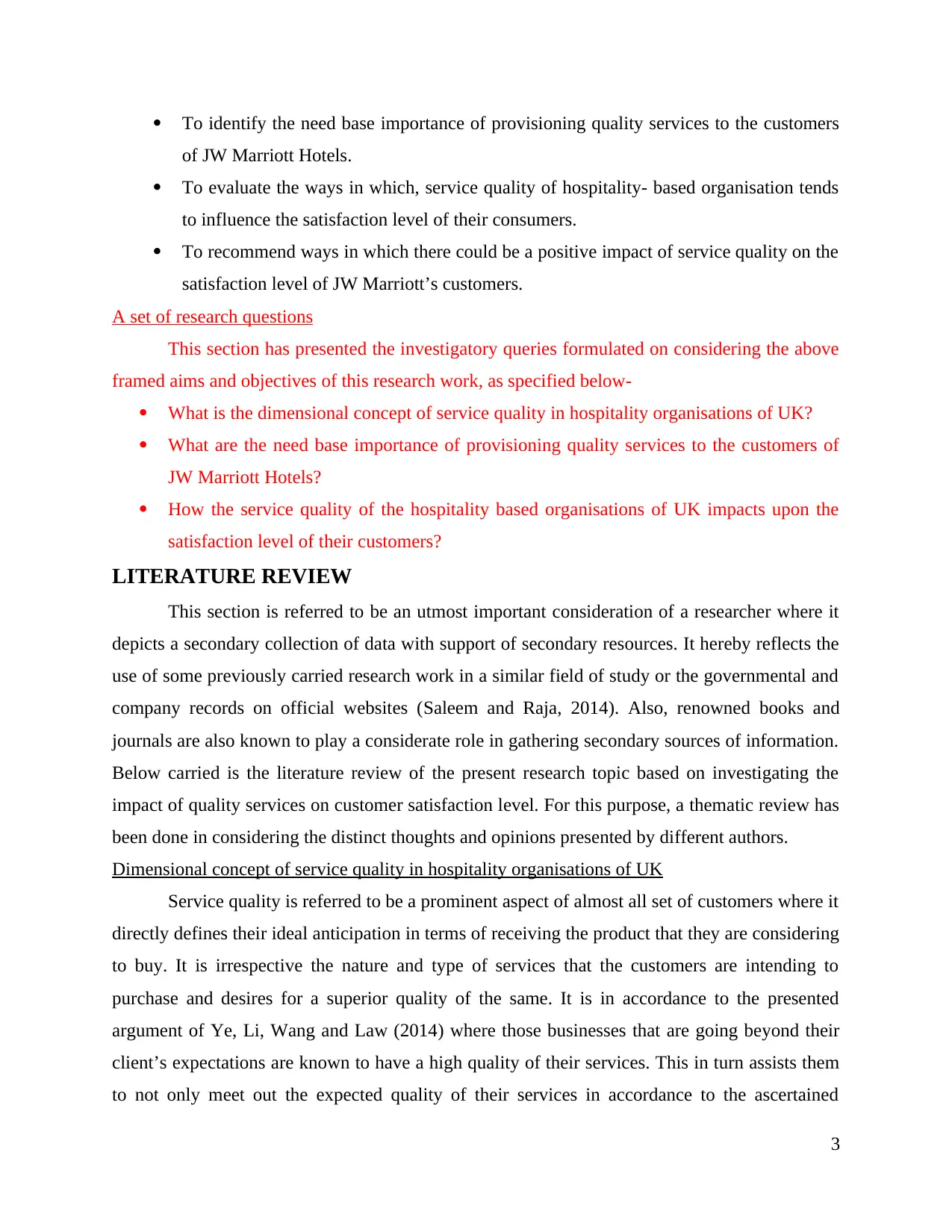
To identify the need base importance of provisioning quality services to the customers
of JW Marriott Hotels.
To evaluate the ways in which, service quality of hospitality- based organisation tends
to influence the satisfaction level of their consumers.
To recommend ways in which there could be a positive impact of service quality on the
satisfaction level of JW Marriott’s customers.
A set of research questions
This section has presented the investigatory queries formulated on considering the above
framed aims and objectives of this research work, as specified below-
What is the dimensional concept of service quality in hospitality organisations of UK?
What are the need base importance of provisioning quality services to the customers of
JW Marriott Hotels?
How the service quality of the hospitality based organisations of UK impacts upon the
satisfaction level of their customers?
LITERATURE REVIEW
This section is referred to be an utmost important consideration of a researcher where it
depicts a secondary collection of data with support of secondary resources. It hereby reflects the
use of some previously carried research work in a similar field of study or the governmental and
company records on official websites (Saleem and Raja, 2014). Also, renowned books and
journals are also known to play a considerate role in gathering secondary sources of information.
Below carried is the literature review of the present research topic based on investigating the
impact of quality services on customer satisfaction level. For this purpose, a thematic review has
been done in considering the distinct thoughts and opinions presented by different authors.
Dimensional concept of service quality in hospitality organisations of UK
Service quality is referred to be a prominent aspect of almost all set of customers where it
directly defines their ideal anticipation in terms of receiving the product that they are considering
to buy. It is irrespective the nature and type of services that the customers are intending to
purchase and desires for a superior quality of the same. It is in accordance to the presented
argument of Ye, Li, Wang and Law (2014) where those businesses that are going beyond their
client’s expectations are known to have a high quality of their services. This in turn assists them
to not only meet out the expected quality of their services in accordance to the ascertained
3
of JW Marriott Hotels.
To evaluate the ways in which, service quality of hospitality- based organisation tends
to influence the satisfaction level of their consumers.
To recommend ways in which there could be a positive impact of service quality on the
satisfaction level of JW Marriott’s customers.
A set of research questions
This section has presented the investigatory queries formulated on considering the above
framed aims and objectives of this research work, as specified below-
What is the dimensional concept of service quality in hospitality organisations of UK?
What are the need base importance of provisioning quality services to the customers of
JW Marriott Hotels?
How the service quality of the hospitality based organisations of UK impacts upon the
satisfaction level of their customers?
LITERATURE REVIEW
This section is referred to be an utmost important consideration of a researcher where it
depicts a secondary collection of data with support of secondary resources. It hereby reflects the
use of some previously carried research work in a similar field of study or the governmental and
company records on official websites (Saleem and Raja, 2014). Also, renowned books and
journals are also known to play a considerate role in gathering secondary sources of information.
Below carried is the literature review of the present research topic based on investigating the
impact of quality services on customer satisfaction level. For this purpose, a thematic review has
been done in considering the distinct thoughts and opinions presented by different authors.
Dimensional concept of service quality in hospitality organisations of UK
Service quality is referred to be a prominent aspect of almost all set of customers where it
directly defines their ideal anticipation in terms of receiving the product that they are considering
to buy. It is irrespective the nature and type of services that the customers are intending to
purchase and desires for a superior quality of the same. It is in accordance to the presented
argument of Ye, Li, Wang and Law (2014) where those businesses that are going beyond their
client’s expectations are known to have a high quality of their services. This in turn assists them
to not only meet out the expected quality of their services in accordance to the ascertained
3
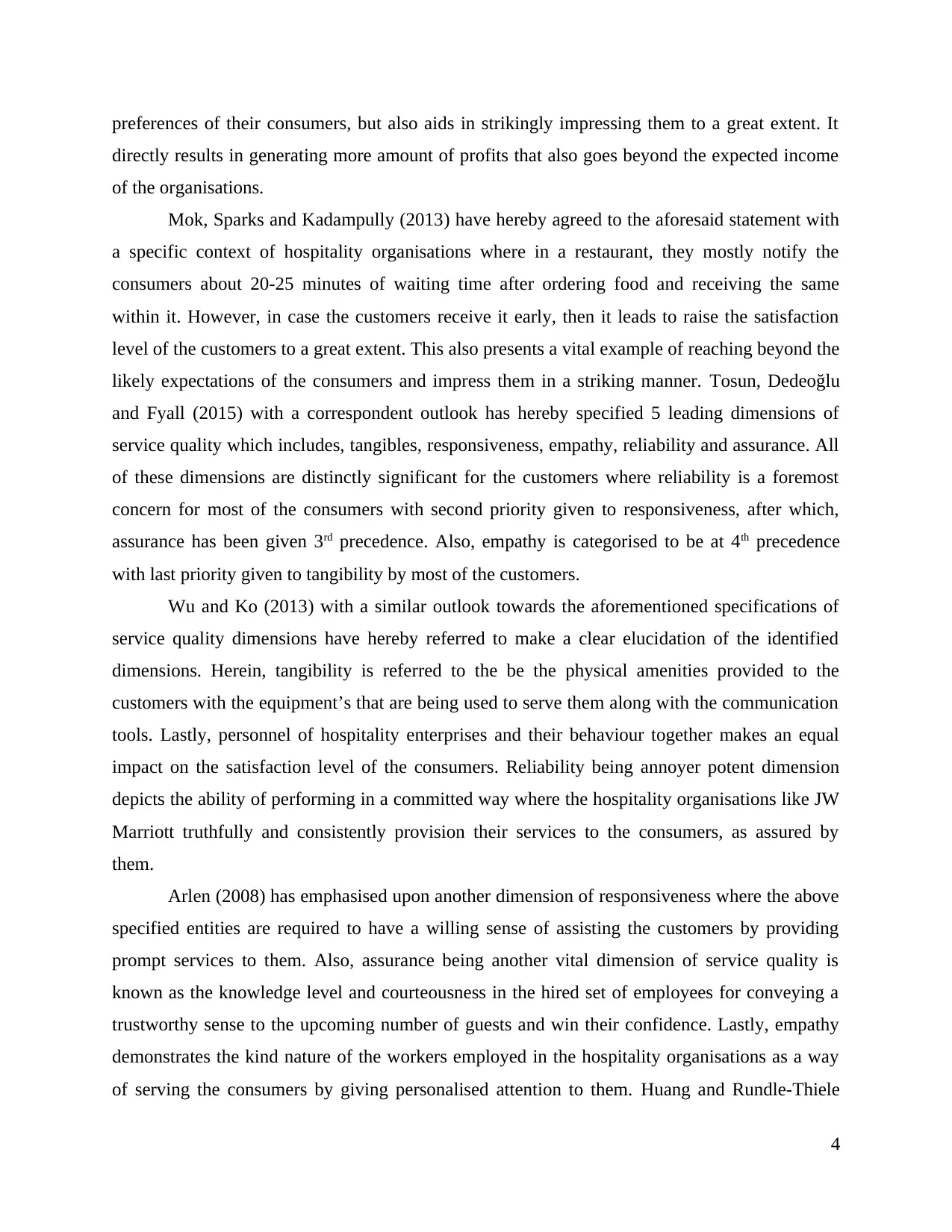
preferences of their consumers, but also aids in strikingly impressing them to a great extent. It
directly results in generating more amount of profits that also goes beyond the expected income
of the organisations.
Mok, Sparks and Kadampully (2013) have hereby agreed to the aforesaid statement with
a specific context of hospitality organisations where in a restaurant, they mostly notify the
consumers about 20-25 minutes of waiting time after ordering food and receiving the same
within it. However, in case the customers receive it early, then it leads to raise the satisfaction
level of the customers to a great extent. This also presents a vital example of reaching beyond the
likely expectations of the consumers and impress them in a striking manner. Tosun, Dedeoğlu
and Fyall (2015) with a correspondent outlook has hereby specified 5 leading dimensions of
service quality which includes, tangibles, responsiveness, empathy, reliability and assurance. All
of these dimensions are distinctly significant for the customers where reliability is a foremost
concern for most of the consumers with second priority given to responsiveness, after which,
assurance has been given 3rd precedence. Also, empathy is categorised to be at 4th precedence
with last priority given to tangibility by most of the customers.
Wu and Ko (2013) with a similar outlook towards the aforementioned specifications of
service quality dimensions have hereby referred to make a clear elucidation of the identified
dimensions. Herein, tangibility is referred to the be the physical amenities provided to the
customers with the equipment’s that are being used to serve them along with the communication
tools. Lastly, personnel of hospitality enterprises and their behaviour together makes an equal
impact on the satisfaction level of the consumers. Reliability being annoyer potent dimension
depicts the ability of performing in a committed way where the hospitality organisations like JW
Marriott truthfully and consistently provision their services to the consumers, as assured by
them.
Arlen (2008) has emphasised upon another dimension of responsiveness where the above
specified entities are required to have a willing sense of assisting the customers by providing
prompt services to them. Also, assurance being another vital dimension of service quality is
known as the knowledge level and courteousness in the hired set of employees for conveying a
trustworthy sense to the upcoming number of guests and win their confidence. Lastly, empathy
demonstrates the kind nature of the workers employed in the hospitality organisations as a way
of serving the consumers by giving personalised attention to them. Huang and Rundle-Thiele
4
directly results in generating more amount of profits that also goes beyond the expected income
of the organisations.
Mok, Sparks and Kadampully (2013) have hereby agreed to the aforesaid statement with
a specific context of hospitality organisations where in a restaurant, they mostly notify the
consumers about 20-25 minutes of waiting time after ordering food and receiving the same
within it. However, in case the customers receive it early, then it leads to raise the satisfaction
level of the customers to a great extent. This also presents a vital example of reaching beyond the
likely expectations of the consumers and impress them in a striking manner. Tosun, Dedeoğlu
and Fyall (2015) with a correspondent outlook has hereby specified 5 leading dimensions of
service quality which includes, tangibles, responsiveness, empathy, reliability and assurance. All
of these dimensions are distinctly significant for the customers where reliability is a foremost
concern for most of the consumers with second priority given to responsiveness, after which,
assurance has been given 3rd precedence. Also, empathy is categorised to be at 4th precedence
with last priority given to tangibility by most of the customers.
Wu and Ko (2013) with a similar outlook towards the aforementioned specifications of
service quality dimensions have hereby referred to make a clear elucidation of the identified
dimensions. Herein, tangibility is referred to the be the physical amenities provided to the
customers with the equipment’s that are being used to serve them along with the communication
tools. Lastly, personnel of hospitality enterprises and their behaviour together makes an equal
impact on the satisfaction level of the consumers. Reliability being annoyer potent dimension
depicts the ability of performing in a committed way where the hospitality organisations like JW
Marriott truthfully and consistently provision their services to the consumers, as assured by
them.
Arlen (2008) has emphasised upon another dimension of responsiveness where the above
specified entities are required to have a willing sense of assisting the customers by providing
prompt services to them. Also, assurance being another vital dimension of service quality is
known as the knowledge level and courteousness in the hired set of employees for conveying a
trustworthy sense to the upcoming number of guests and win their confidence. Lastly, empathy
demonstrates the kind nature of the workers employed in the hospitality organisations as a way
of serving the consumers by giving personalised attention to them. Huang and Rundle-Thiele
4
⊘ This is a preview!⊘
Do you want full access?
Subscribe today to unlock all pages.

Trusted by 1+ million students worldwide
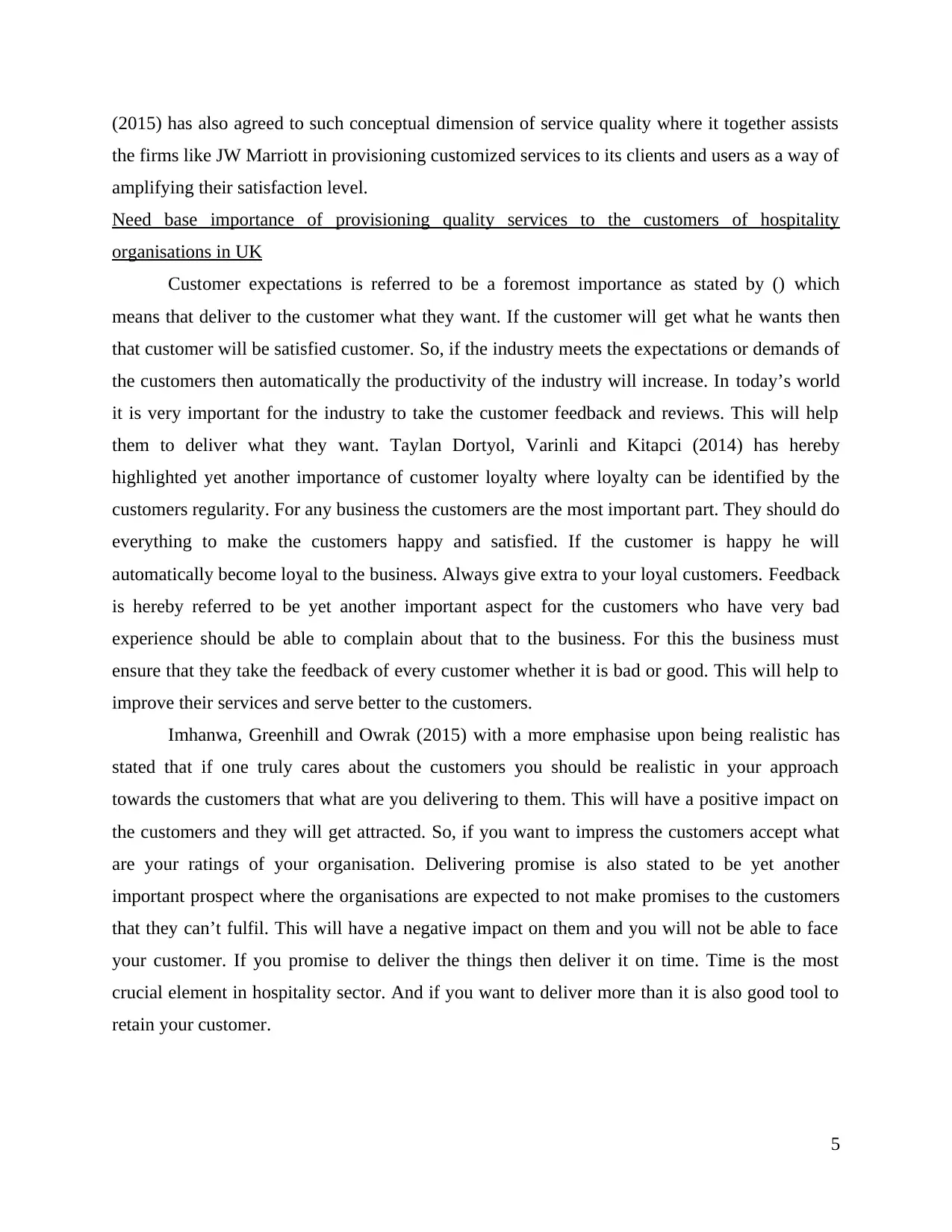
(2015) has also agreed to such conceptual dimension of service quality where it together assists
the firms like JW Marriott in provisioning customized services to its clients and users as a way of
amplifying their satisfaction level.
Need base importance of provisioning quality services to the customers of hospitality
organisations in UK
Customer expectations is referred to be a foremost importance as stated by () which
means that deliver to the customer what they want. If the customer will get what he wants then
that customer will be satisfied customer. So, if the industry meets the expectations or demands of
the customers then automatically the productivity of the industry will increase. In today’s world
it is very important for the industry to take the customer feedback and reviews. This will help
them to deliver what they want. Taylan Dortyol, Varinli and Kitapci (2014) has hereby
highlighted yet another importance of customer loyalty where loyalty can be identified by the
customers regularity. For any business the customers are the most important part. They should do
everything to make the customers happy and satisfied. If the customer is happy he will
automatically become loyal to the business. Always give extra to your loyal customers. Feedback
is hereby referred to be yet another important aspect for the customers who have very bad
experience should be able to complain about that to the business. For this the business must
ensure that they take the feedback of every customer whether it is bad or good. This will help to
improve their services and serve better to the customers.
Imhanwa, Greenhill and Owrak (2015) with a more emphasise upon being realistic has
stated that if one truly cares about the customers you should be realistic in your approach
towards the customers that what are you delivering to them. This will have a positive impact on
the customers and they will get attracted. So, if you want to impress the customers accept what
are your ratings of your organisation. Delivering promise is also stated to be yet another
important prospect where the organisations are expected to not make promises to the customers
that they can’t fulfil. This will have a negative impact on them and you will not be able to face
your customer. If you promise to deliver the things then deliver it on time. Time is the most
crucial element in hospitality sector. And if you want to deliver more than it is also good tool to
retain your customer.
5
the firms like JW Marriott in provisioning customized services to its clients and users as a way of
amplifying their satisfaction level.
Need base importance of provisioning quality services to the customers of hospitality
organisations in UK
Customer expectations is referred to be a foremost importance as stated by () which
means that deliver to the customer what they want. If the customer will get what he wants then
that customer will be satisfied customer. So, if the industry meets the expectations or demands of
the customers then automatically the productivity of the industry will increase. In today’s world
it is very important for the industry to take the customer feedback and reviews. This will help
them to deliver what they want. Taylan Dortyol, Varinli and Kitapci (2014) has hereby
highlighted yet another importance of customer loyalty where loyalty can be identified by the
customers regularity. For any business the customers are the most important part. They should do
everything to make the customers happy and satisfied. If the customer is happy he will
automatically become loyal to the business. Always give extra to your loyal customers. Feedback
is hereby referred to be yet another important aspect for the customers who have very bad
experience should be able to complain about that to the business. For this the business must
ensure that they take the feedback of every customer whether it is bad or good. This will help to
improve their services and serve better to the customers.
Imhanwa, Greenhill and Owrak (2015) with a more emphasise upon being realistic has
stated that if one truly cares about the customers you should be realistic in your approach
towards the customers that what are you delivering to them. This will have a positive impact on
the customers and they will get attracted. So, if you want to impress the customers accept what
are your ratings of your organisation. Delivering promise is also stated to be yet another
important prospect where the organisations are expected to not make promises to the customers
that they can’t fulfil. This will have a negative impact on them and you will not be able to face
your customer. If you promise to deliver the things then deliver it on time. Time is the most
crucial element in hospitality sector. And if you want to deliver more than it is also good tool to
retain your customer.
5
Paraphrase This Document
Need a fresh take? Get an instant paraphrase of this document with our AI Paraphraser
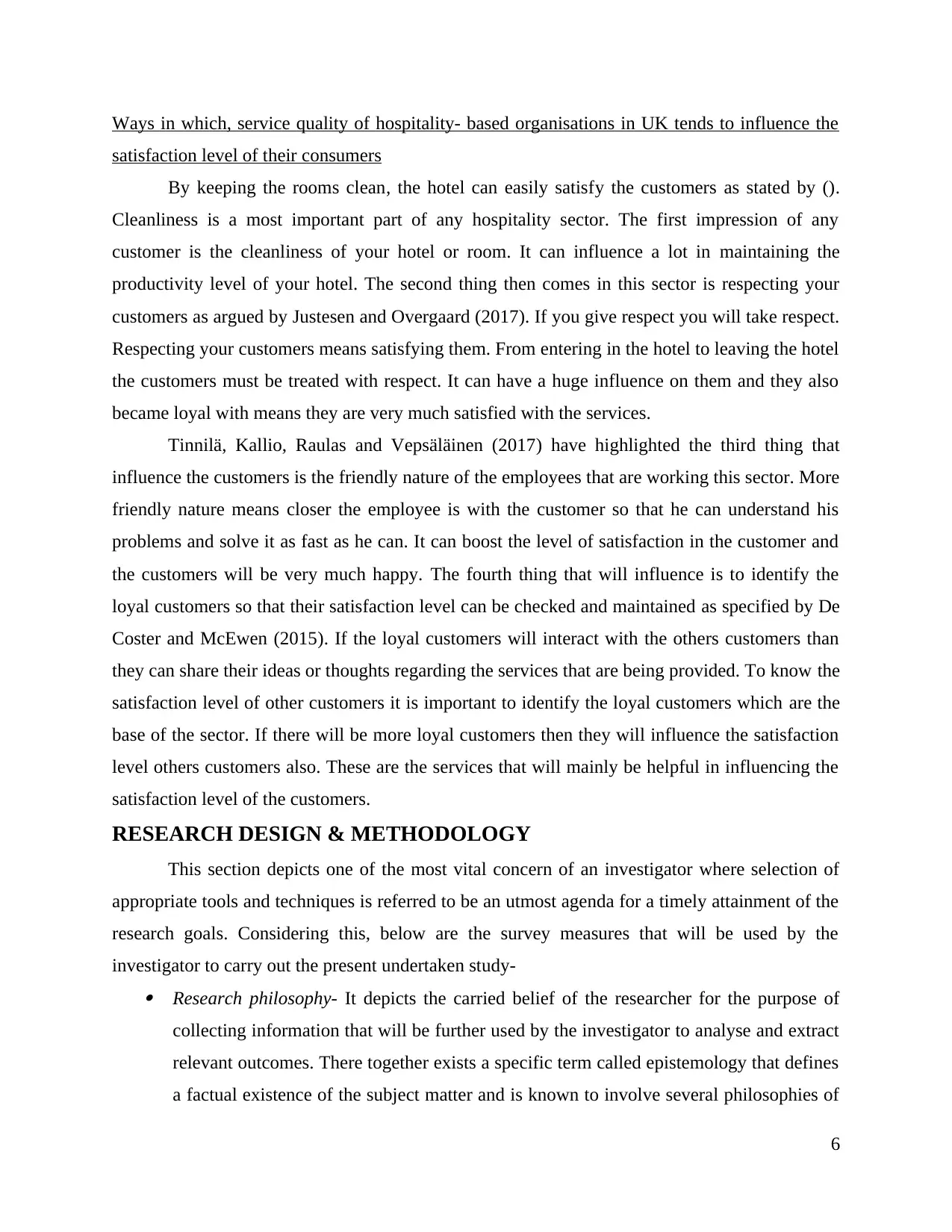
Ways in which, service quality of hospitality- based organisations in UK tends to influence the
satisfaction level of their consumers
By keeping the rooms clean, the hotel can easily satisfy the customers as stated by ().
Cleanliness is a most important part of any hospitality sector. The first impression of any
customer is the cleanliness of your hotel or room. It can influence a lot in maintaining the
productivity level of your hotel. The second thing then comes in this sector is respecting your
customers as argued by Justesen and Overgaard (2017). If you give respect you will take respect.
Respecting your customers means satisfying them. From entering in the hotel to leaving the hotel
the customers must be treated with respect. It can have a huge influence on them and they also
became loyal with means they are very much satisfied with the services.
Tinnilä, Kallio, Raulas and Vepsäläinen (2017) have highlighted the third thing that
influence the customers is the friendly nature of the employees that are working this sector. More
friendly nature means closer the employee is with the customer so that he can understand his
problems and solve it as fast as he can. It can boost the level of satisfaction in the customer and
the customers will be very much happy. The fourth thing that will influence is to identify the
loyal customers so that their satisfaction level can be checked and maintained as specified by De
Coster and McEwen (2015). If the loyal customers will interact with the others customers than
they can share their ideas or thoughts regarding the services that are being provided. To know the
satisfaction level of other customers it is important to identify the loyal customers which are the
base of the sector. If there will be more loyal customers then they will influence the satisfaction
level others customers also. These are the services that will mainly be helpful in influencing the
satisfaction level of the customers.
RESEARCH DESIGN & METHODOLOGY
This section depicts one of the most vital concern of an investigator where selection of
appropriate tools and techniques is referred to be an utmost agenda for a timely attainment of the
research goals. Considering this, below are the survey measures that will be used by the
investigator to carry out the present undertaken study- Research philosophy- It depicts the carried belief of the researcher for the purpose of
collecting information that will be further used by the investigator to analyse and extract
relevant outcomes. There together exists a specific term called epistemology that defines
a factual existence of the subject matter and is known to involve several philosophies of
6
satisfaction level of their consumers
By keeping the rooms clean, the hotel can easily satisfy the customers as stated by ().
Cleanliness is a most important part of any hospitality sector. The first impression of any
customer is the cleanliness of your hotel or room. It can influence a lot in maintaining the
productivity level of your hotel. The second thing then comes in this sector is respecting your
customers as argued by Justesen and Overgaard (2017). If you give respect you will take respect.
Respecting your customers means satisfying them. From entering in the hotel to leaving the hotel
the customers must be treated with respect. It can have a huge influence on them and they also
became loyal with means they are very much satisfied with the services.
Tinnilä, Kallio, Raulas and Vepsäläinen (2017) have highlighted the third thing that
influence the customers is the friendly nature of the employees that are working this sector. More
friendly nature means closer the employee is with the customer so that he can understand his
problems and solve it as fast as he can. It can boost the level of satisfaction in the customer and
the customers will be very much happy. The fourth thing that will influence is to identify the
loyal customers so that their satisfaction level can be checked and maintained as specified by De
Coster and McEwen (2015). If the loyal customers will interact with the others customers than
they can share their ideas or thoughts regarding the services that are being provided. To know the
satisfaction level of other customers it is important to identify the loyal customers which are the
base of the sector. If there will be more loyal customers then they will influence the satisfaction
level others customers also. These are the services that will mainly be helpful in influencing the
satisfaction level of the customers.
RESEARCH DESIGN & METHODOLOGY
This section depicts one of the most vital concern of an investigator where selection of
appropriate tools and techniques is referred to be an utmost agenda for a timely attainment of the
research goals. Considering this, below are the survey measures that will be used by the
investigator to carry out the present undertaken study- Research philosophy- It depicts the carried belief of the researcher for the purpose of
collecting information that will be further used by the investigator to analyse and extract
relevant outcomes. There together exists a specific term called epistemology that defines
a factual existence of the subject matter and is known to involve several philosophies of
6
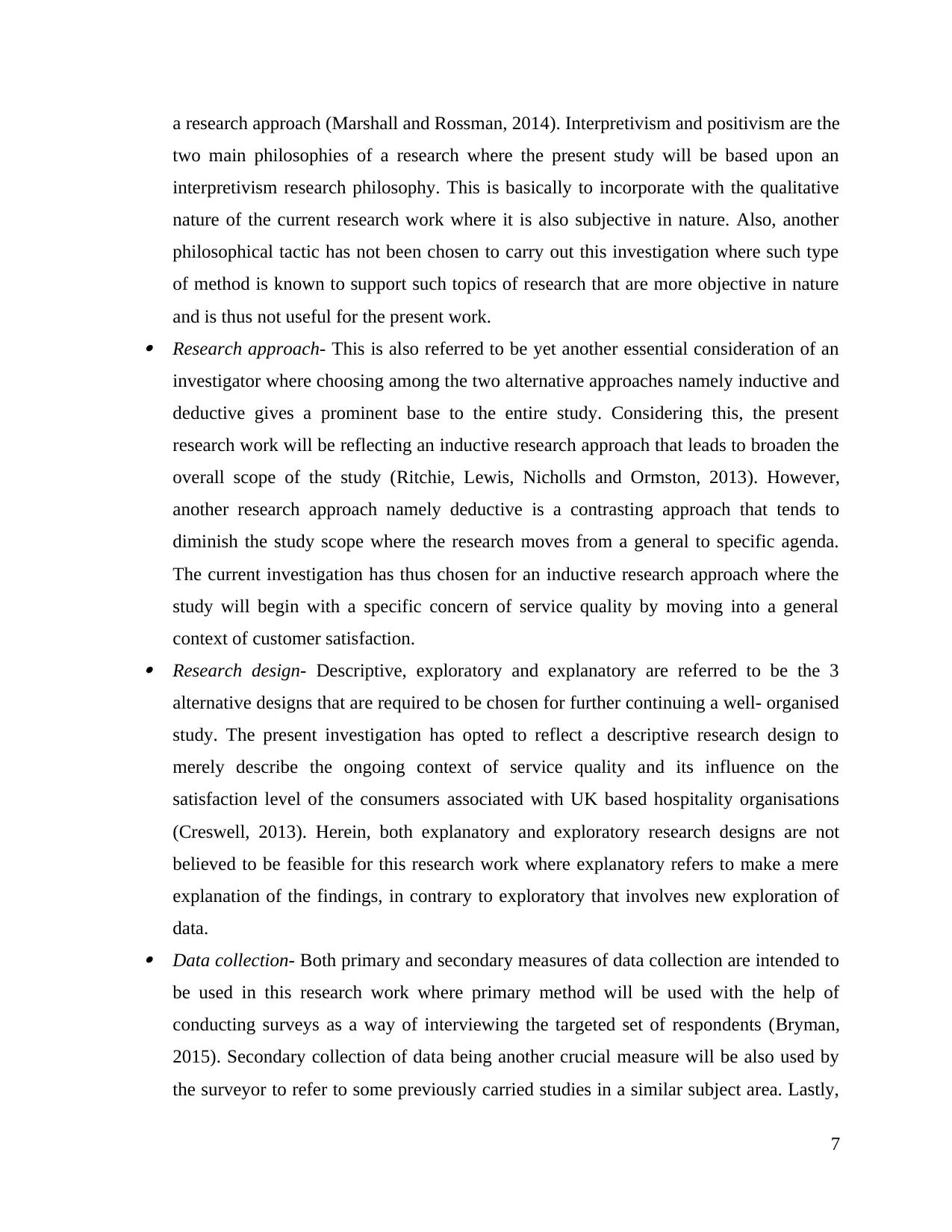
a research approach (Marshall and Rossman, 2014). Interpretivism and positivism are the
two main philosophies of a research where the present study will be based upon an
interpretivism research philosophy. This is basically to incorporate with the qualitative
nature of the current research work where it is also subjective in nature. Also, another
philosophical tactic has not been chosen to carry out this investigation where such type
of method is known to support such topics of research that are more objective in nature
and is thus not useful for the present work. Research approach- This is also referred to be yet another essential consideration of an
investigator where choosing among the two alternative approaches namely inductive and
deductive gives a prominent base to the entire study. Considering this, the present
research work will be reflecting an inductive research approach that leads to broaden the
overall scope of the study (Ritchie, Lewis, Nicholls and Ormston, 2013). However,
another research approach namely deductive is a contrasting approach that tends to
diminish the study scope where the research moves from a general to specific agenda.
The current investigation has thus chosen for an inductive research approach where the
study will begin with a specific concern of service quality by moving into a general
context of customer satisfaction. Research design- Descriptive, exploratory and explanatory are referred to be the 3
alternative designs that are required to be chosen for further continuing a well- organised
study. The present investigation has opted to reflect a descriptive research design to
merely describe the ongoing context of service quality and its influence on the
satisfaction level of the consumers associated with UK based hospitality organisations
(Creswell, 2013). Herein, both explanatory and exploratory research designs are not
believed to be feasible for this research work where explanatory refers to make a mere
explanation of the findings, in contrary to exploratory that involves new exploration of
data. Data collection- Both primary and secondary measures of data collection are intended to
be used in this research work where primary method will be used with the help of
conducting surveys as a way of interviewing the targeted set of respondents (Bryman,
2015). Secondary collection of data being another crucial measure will be also used by
the surveyor to refer to some previously carried studies in a similar subject area. Lastly,
7
two main philosophies of a research where the present study will be based upon an
interpretivism research philosophy. This is basically to incorporate with the qualitative
nature of the current research work where it is also subjective in nature. Also, another
philosophical tactic has not been chosen to carry out this investigation where such type
of method is known to support such topics of research that are more objective in nature
and is thus not useful for the present work. Research approach- This is also referred to be yet another essential consideration of an
investigator where choosing among the two alternative approaches namely inductive and
deductive gives a prominent base to the entire study. Considering this, the present
research work will be reflecting an inductive research approach that leads to broaden the
overall scope of the study (Ritchie, Lewis, Nicholls and Ormston, 2013). However,
another research approach namely deductive is a contrasting approach that tends to
diminish the study scope where the research moves from a general to specific agenda.
The current investigation has thus chosen for an inductive research approach where the
study will begin with a specific concern of service quality by moving into a general
context of customer satisfaction. Research design- Descriptive, exploratory and explanatory are referred to be the 3
alternative designs that are required to be chosen for further continuing a well- organised
study. The present investigation has opted to reflect a descriptive research design to
merely describe the ongoing context of service quality and its influence on the
satisfaction level of the consumers associated with UK based hospitality organisations
(Creswell, 2013). Herein, both explanatory and exploratory research designs are not
believed to be feasible for this research work where explanatory refers to make a mere
explanation of the findings, in contrary to exploratory that involves new exploration of
data. Data collection- Both primary and secondary measures of data collection are intended to
be used in this research work where primary method will be used with the help of
conducting surveys as a way of interviewing the targeted set of respondents (Bryman,
2015). Secondary collection of data being another crucial measure will be also used by
the surveyor to refer to some previously carried studies in a similar subject area. Lastly,
7
⊘ This is a preview!⊘
Do you want full access?
Subscribe today to unlock all pages.

Trusted by 1+ million students worldwide
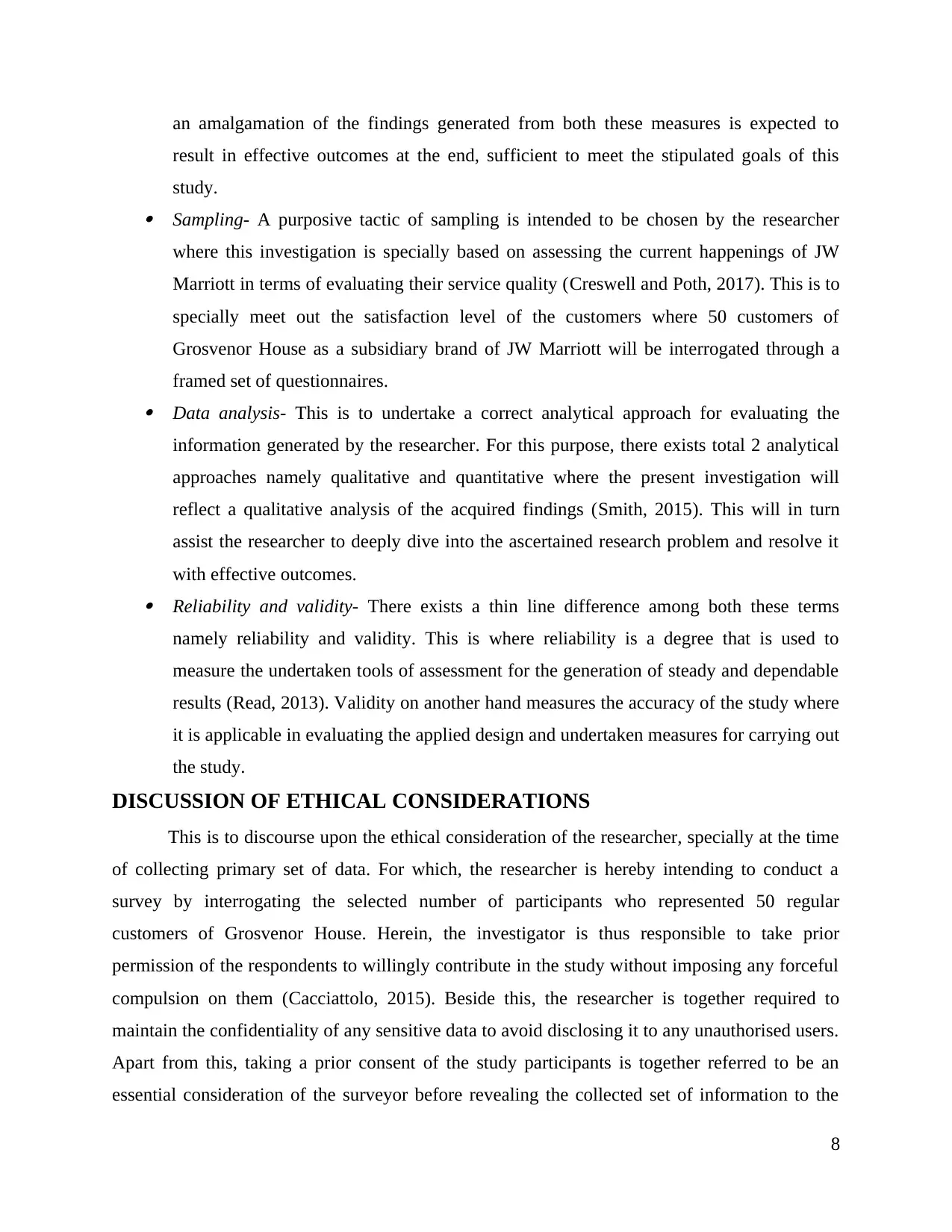
an amalgamation of the findings generated from both these measures is expected to
result in effective outcomes at the end, sufficient to meet the stipulated goals of this
study. Sampling- A purposive tactic of sampling is intended to be chosen by the researcher
where this investigation is specially based on assessing the current happenings of JW
Marriott in terms of evaluating their service quality (Creswell and Poth, 2017). This is to
specially meet out the satisfaction level of the customers where 50 customers of
Grosvenor House as a subsidiary brand of JW Marriott will be interrogated through a
framed set of questionnaires. Data analysis- This is to undertake a correct analytical approach for evaluating the
information generated by the researcher. For this purpose, there exists total 2 analytical
approaches namely qualitative and quantitative where the present investigation will
reflect a qualitative analysis of the acquired findings (Smith, 2015). This will in turn
assist the researcher to deeply dive into the ascertained research problem and resolve it
with effective outcomes. Reliability and validity- There exists a thin line difference among both these terms
namely reliability and validity. This is where reliability is a degree that is used to
measure the undertaken tools of assessment for the generation of steady and dependable
results (Read, 2013). Validity on another hand measures the accuracy of the study where
it is applicable in evaluating the applied design and undertaken measures for carrying out
the study.
DISCUSSION OF ETHICAL CONSIDERATIONS
This is to discourse upon the ethical consideration of the researcher, specially at the time
of collecting primary set of data. For which, the researcher is hereby intending to conduct a
survey by interrogating the selected number of participants who represented 50 regular
customers of Grosvenor House. Herein, the investigator is thus responsible to take prior
permission of the respondents to willingly contribute in the study without imposing any forceful
compulsion on them (Cacciattolo, 2015). Beside this, the researcher is together required to
maintain the confidentiality of any sensitive data to avoid disclosing it to any unauthorised users.
Apart from this, taking a prior consent of the study participants is together referred to be an
essential consideration of the surveyor before revealing the collected set of information to the
8
result in effective outcomes at the end, sufficient to meet the stipulated goals of this
study. Sampling- A purposive tactic of sampling is intended to be chosen by the researcher
where this investigation is specially based on assessing the current happenings of JW
Marriott in terms of evaluating their service quality (Creswell and Poth, 2017). This is to
specially meet out the satisfaction level of the customers where 50 customers of
Grosvenor House as a subsidiary brand of JW Marriott will be interrogated through a
framed set of questionnaires. Data analysis- This is to undertake a correct analytical approach for evaluating the
information generated by the researcher. For this purpose, there exists total 2 analytical
approaches namely qualitative and quantitative where the present investigation will
reflect a qualitative analysis of the acquired findings (Smith, 2015). This will in turn
assist the researcher to deeply dive into the ascertained research problem and resolve it
with effective outcomes. Reliability and validity- There exists a thin line difference among both these terms
namely reliability and validity. This is where reliability is a degree that is used to
measure the undertaken tools of assessment for the generation of steady and dependable
results (Read, 2013). Validity on another hand measures the accuracy of the study where
it is applicable in evaluating the applied design and undertaken measures for carrying out
the study.
DISCUSSION OF ETHICAL CONSIDERATIONS
This is to discourse upon the ethical consideration of the researcher, specially at the time
of collecting primary set of data. For which, the researcher is hereby intending to conduct a
survey by interrogating the selected number of participants who represented 50 regular
customers of Grosvenor House. Herein, the investigator is thus responsible to take prior
permission of the respondents to willingly contribute in the study without imposing any forceful
compulsion on them (Cacciattolo, 2015). Beside this, the researcher is together required to
maintain the confidentiality of any sensitive data to avoid disclosing it to any unauthorised users.
Apart from this, taking a prior consent of the study participants is together referred to be an
essential consideration of the surveyor before revealing the collected set of information to the
8
Paraphrase This Document
Need a fresh take? Get an instant paraphrase of this document with our AI Paraphraser
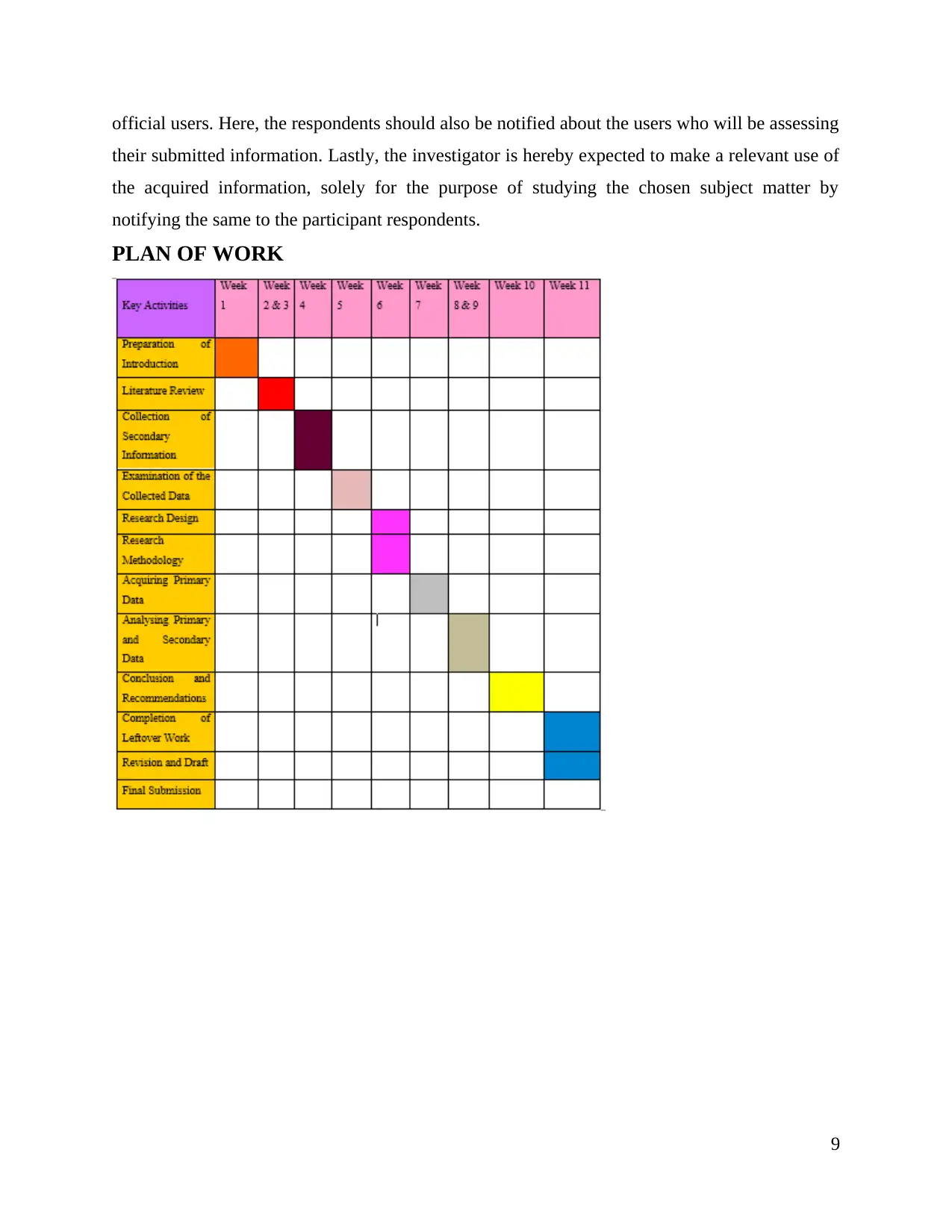
official users. Here, the respondents should also be notified about the users who will be assessing
their submitted information. Lastly, the investigator is hereby expected to make a relevant use of
the acquired information, solely for the purpose of studying the chosen subject matter by
notifying the same to the participant respondents.
PLAN OF WORK
9
their submitted information. Lastly, the investigator is hereby expected to make a relevant use of
the acquired information, solely for the purpose of studying the chosen subject matter by
notifying the same to the participant respondents.
PLAN OF WORK
9
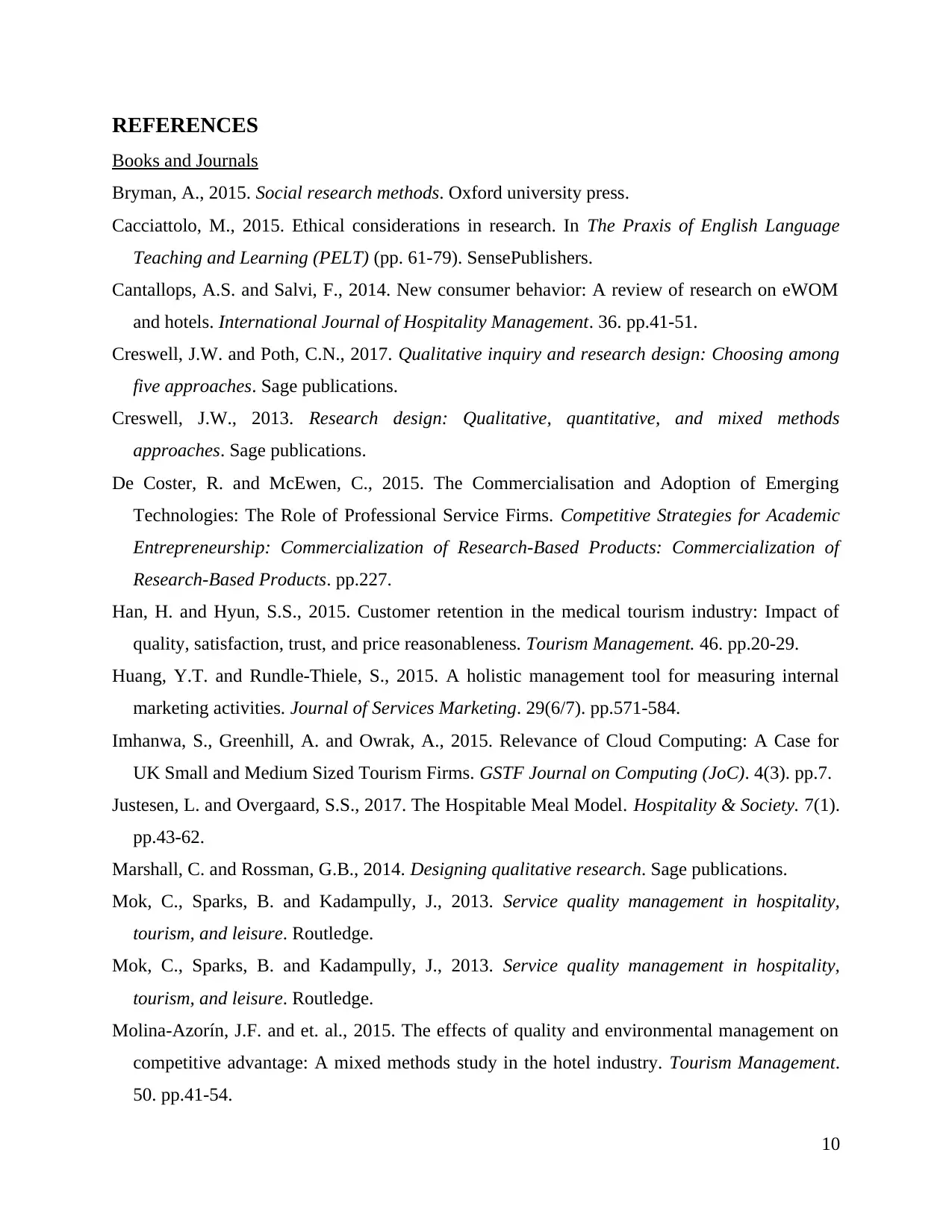
REFERENCES
Books and Journals
Bryman, A., 2015. Social research methods. Oxford university press.
Cacciattolo, M., 2015. Ethical considerations in research. In The Praxis of English Language
Teaching and Learning (PELT) (pp. 61-79). SensePublishers.
Cantallops, A.S. and Salvi, F., 2014. New consumer behavior: A review of research on eWOM
and hotels. International Journal of Hospitality Management. 36. pp.41-51.
Creswell, J.W. and Poth, C.N., 2017. Qualitative inquiry and research design: Choosing among
five approaches. Sage publications.
Creswell, J.W., 2013. Research design: Qualitative, quantitative, and mixed methods
approaches. Sage publications.
De Coster, R. and McEwen, C., 2015. The Commercialisation and Adoption of Emerging
Technologies: The Role of Professional Service Firms. Competitive Strategies for Academic
Entrepreneurship: Commercialization of Research-Based Products: Commercialization of
Research-Based Products. pp.227.
Han, H. and Hyun, S.S., 2015. Customer retention in the medical tourism industry: Impact of
quality, satisfaction, trust, and price reasonableness. Tourism Management. 46. pp.20-29.
Huang, Y.T. and Rundle-Thiele, S., 2015. A holistic management tool for measuring internal
marketing activities. Journal of Services Marketing. 29(6/7). pp.571-584.
Imhanwa, S., Greenhill, A. and Owrak, A., 2015. Relevance of Cloud Computing: A Case for
UK Small and Medium Sized Tourism Firms. GSTF Journal on Computing (JoC). 4(3). pp.7.
Justesen, L. and Overgaard, S.S., 2017. The Hospitable Meal Model. Hospitality & Society. 7(1).
pp.43-62.
Marshall, C. and Rossman, G.B., 2014. Designing qualitative research. Sage publications.
Mok, C., Sparks, B. and Kadampully, J., 2013. Service quality management in hospitality,
tourism, and leisure. Routledge.
Mok, C., Sparks, B. and Kadampully, J., 2013. Service quality management in hospitality,
tourism, and leisure. Routledge.
Molina-Azorín, J.F. and et. al., 2015. The effects of quality and environmental management on
competitive advantage: A mixed methods study in the hotel industry. Tourism Management.
50. pp.41-54.
10
Books and Journals
Bryman, A., 2015. Social research methods. Oxford university press.
Cacciattolo, M., 2015. Ethical considerations in research. In The Praxis of English Language
Teaching and Learning (PELT) (pp. 61-79). SensePublishers.
Cantallops, A.S. and Salvi, F., 2014. New consumer behavior: A review of research on eWOM
and hotels. International Journal of Hospitality Management. 36. pp.41-51.
Creswell, J.W. and Poth, C.N., 2017. Qualitative inquiry and research design: Choosing among
five approaches. Sage publications.
Creswell, J.W., 2013. Research design: Qualitative, quantitative, and mixed methods
approaches. Sage publications.
De Coster, R. and McEwen, C., 2015. The Commercialisation and Adoption of Emerging
Technologies: The Role of Professional Service Firms. Competitive Strategies for Academic
Entrepreneurship: Commercialization of Research-Based Products: Commercialization of
Research-Based Products. pp.227.
Han, H. and Hyun, S.S., 2015. Customer retention in the medical tourism industry: Impact of
quality, satisfaction, trust, and price reasonableness. Tourism Management. 46. pp.20-29.
Huang, Y.T. and Rundle-Thiele, S., 2015. A holistic management tool for measuring internal
marketing activities. Journal of Services Marketing. 29(6/7). pp.571-584.
Imhanwa, S., Greenhill, A. and Owrak, A., 2015. Relevance of Cloud Computing: A Case for
UK Small and Medium Sized Tourism Firms. GSTF Journal on Computing (JoC). 4(3). pp.7.
Justesen, L. and Overgaard, S.S., 2017. The Hospitable Meal Model. Hospitality & Society. 7(1).
pp.43-62.
Marshall, C. and Rossman, G.B., 2014. Designing qualitative research. Sage publications.
Mok, C., Sparks, B. and Kadampully, J., 2013. Service quality management in hospitality,
tourism, and leisure. Routledge.
Mok, C., Sparks, B. and Kadampully, J., 2013. Service quality management in hospitality,
tourism, and leisure. Routledge.
Molina-Azorín, J.F. and et. al., 2015. The effects of quality and environmental management on
competitive advantage: A mixed methods study in the hotel industry. Tourism Management.
50. pp.41-54.
10
⊘ This is a preview!⊘
Do you want full access?
Subscribe today to unlock all pages.

Trusted by 1+ million students worldwide
1 out of 13
Related Documents
Your All-in-One AI-Powered Toolkit for Academic Success.
+13062052269
info@desklib.com
Available 24*7 on WhatsApp / Email
![[object Object]](/_next/static/media/star-bottom.7253800d.svg)
Unlock your academic potential
Copyright © 2020–2026 A2Z Services. All Rights Reserved. Developed and managed by ZUCOL.





